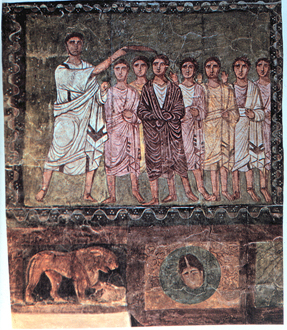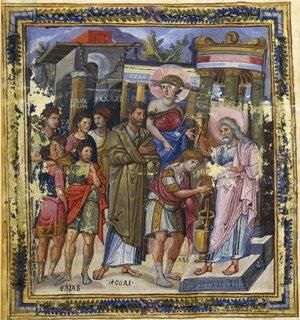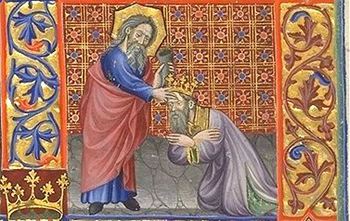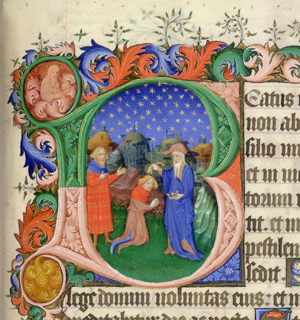Vision Correction:
Jesus Heals the Man Born Blind
For Sunday March 30, 2014
The Fourth Sunday in Lent
Lectionary Readings (Revised Common Lectionary, Year A)
1 Samuel 16 :1–13
1 Samuel 16:1–1316:1 The Lord said to Samuel, “How long will you mourn for Saul, since I have rejected him as king over Israel? Fill your horn with oil and be on your way; I am sending you to Jesse of Bethlehem. I have chosen one of his sons to be king.”
2 But Samuel said, “How can I go? If Saul hears about it, he will kill me.”
The Lord said, “Take a heifer with you and say, ‘I have come to sacrifice to the Lord.’
3 Invite Jesse to the sacrifice, and I will show you what to do. You are to anoint for me the one I indicate.”
4 Samuel did what the Lord said. When he arrived at Bethlehem, the elders of the town trembled when they met him. They asked, “Do you come in peace?”
5 Samuel replied, “Yes, in peace; I have come to sacrifice to the Lord. Consecrate yourselves and come to the sacrifice with me.” Then he consecrated Jesse and his sons and invited them to the sacrifice.
6 When they arrived, Samuel saw Eliab and thought, “Surely the Lord’s anointed stands here before the Lord.”
7 But the Lord said to Samuel, “Do not consider his appearance or his height, for I have rejected him. The Lord does not look at the things people look at. People look at the outward appearance, but the Lord looks at the heart.”
8 Then Jesse called Abinadab and had him pass in front of Samuel. But Samuel said, “The Lord has not chosen this one either.”
9 Jesse then had Shammah pass by, but Samuel said, “Nor has the Lord chosen this one.”
10 Jesse had seven of his sons pass before Samuel, but Samuel said to him, “The Lord has not chosen these.”
11 So he asked Jesse, “Are these all the sons you have?”
“There is still the youngest,” Jesse answered. “He is tending the sheep.”
Samuel said, “Send for him; we will not sit down until he arrives.”
12 So he sent for him and had him brought in. He was glowing with health and had a fine appearance and handsome features.
Then the Lord said, “Rise and anoint him; this is the one.”
13 So Samuel took the horn of oil and anointed him in the presence of his brothers, and from that day on the Spirit of the Lord came powerfully upon David. Samuel then went to Ramah.
Psalm 23
Psalm 23
1 The Lord is my shepherd, I lack nothing.
2 He makes me lie down in green pastures,
he leads me beside quiet waters,
3 he refreshes my soul.
He guides me along the right paths
for his name’s sake.
4 Even though I walk
through the darkest valley,
I will fear no evil,
for you are with me;
your rod and your staff,
they comfort me.
5 You prepare a table before me
in the presence of my enemies.
You anoint my head with oil;
my cup overflows.
6 Surely your goodness and love will follow me
all the days of my life,
and I will dwell in the house of the Lord
forever.
Ephesians 5:8–14
Ephesians 5:8-14
8 For you were once darkness, but now you are light in the Lord. Live as children of light
9 (for the fruit of the light consists in all goodness, righteousness and truth)
10 and find out what pleases the Lord.
11 Have nothing to do with the fruitless deeds of darkness, but rather expose them.
12 It is shameful even to mention what the disobedient do in secret.
13 But everything exposed by the light becomes visible—and everything that is illuminated becomes a light.
14 This is why it is said:
“Wake up, sleeper,
rise from the dead,
and Christ will shine on you.”
John 9:1–41
John 9:1-41
9:1 As he went along, he saw a man blind from birth.
2 His disciples asked him, “Rabbi, who sinned, this man or his parents, that he was born blind?”
3 “Neither this man nor his parents sinned,” said Jesus, “but this happened so that the works of God might be displayed in him.
4 As long as it is day, we must do the works of him who sent me. Night is coming, when no one can work.
5 While I am in the world, I am the light of the world.”
6 After saying this, he spit on the ground, made some mud with the saliva, and put it on the man’s eyes.
7 “Go,” he told him, “wash in the Pool of Siloam” (this word means “Sent”). So the man went and washed, and came home seeing.
8 His neighbors and those who had formerly seen him begging asked, “Isn’t this the same man who used to sit and beg?”
9 Some claimed that he was.
Others said, “No, he only looks like him.”
But he himself insisted, “I am the man.”
10 “How then were your eyes opened?” they asked.
11 He replied, “The man they call Jesus made some mud and put it on my eyes. He told me to go to Siloam and wash. So I went and washed, and then I could see.”
12 “Where is this man?” they asked him.
“I don’t know,” he said.
13 They brought to the Pharisees the man who had been blind.
14 Now the day on which Jesus had made the mud and opened the man’s eyes was a Sabbath.
15 Therefore the Pharisees also asked him how he had received his sight. “He put mud on my eyes,” the man replied, “and I washed, and now I see.”
16 Some of the Pharisees said, “This man is not from God, for he does not keep the Sabbath.”
But others asked, “How can a sinner perform such signs?” So they were divided.
17 Then they turned again to the blind man, “What have you to say about him? It was your eyes he opened.”
The man replied, “He is a prophet.”
18 They still did not believe that he had been blind and had received his sight until they sent for the man’s parents.
19 “Is this your son?” they asked. “Is this the one you say was born blind? How is it that now he can see?”
20 “We know he is our son,” the parents answered, “and we know he was born blind.
21 But how he can see now, or who opened his eyes, we don’t know. Ask him. He is of age; he will speak for himself.”
22 His parents said this because they were afraid of the Jewish leaders, who already had decided that anyone who acknowledged that Jesus was the Messiah would be put out of the synagogue.
23 That was why his parents said, “He is of age; ask him.”
24 A second time they summoned the man who had been blind. “Give glory to God by telling the truth,” they said. “We know this man is a sinner.”
25 He replied, “Whether he is a sinner or not, I don’t know. One thing I do know. I was blind but now I see!”
26 Then they asked him, “What did he do to you? How did he open your eyes?”
27 He answered, “I have told you already and you did not listen. Why do you want to hear it again? Do you want to become his disciples too?”
28 Then they hurled insults at him and said, “You are this fellow’s disciple! We are disciples of Moses!
29 We know that God spoke to Moses, but as for this fellow, we don’t even know where he comes from.”
30 The man answered, “Now that is remarkable! You don’t know where he comes from, yet he opened my eyes.
31 We know that God does not listen to sinners. He listens to the godly person who does his will.
32 Nobody has ever heard of opening the eyes of a man born blind.
33 If this man were not from God, he could do nothing.”
34 To this they replied, “You were steeped in sin at birth; how dare you lecture us!” And they threw him out.
35 Jesus heard that they had thrown him out, and when he found him, he said, “Do you believe in the Son of Man?”
36 “Who is he, sir?” the man asked. “Tell me so that I may believe in him.”
37 Jesus said, “You have now seen him; in fact, he is the one speaking with you.”
38 Then the man said, “Lord, I believe,” and he worshiped him.
39 Jesus said,[a] “For judgment I have come into this world, so that the blind will see and those who see will become blind.”
40 Some Pharisees who were with him heard him say this and asked, “What? Are we blind too?”
41 Jesus said, “If you were blind, you would not be guilty of sin; but now that you claim you can see, your guilt remains.
What do you see — one vase or two faces? That's the interesting optical illusion made famous by the Danish psychologist Edgar Rubin. When shown a simple picture, some people see a white vase on a black background. Others see two black faces on a white background.
What you see doesn't depend on the image. You can choose to see the "other" image by reversing the object in the foreground and its background. How the brain processes vision is dynamic and malleable. Different people see different things when looking at the same object.
In two of the readings this week, we're challenged to see the world like God sees it. To see things like God does, rather than the way the world does, is an essential part of being God's people in the world. You might say that we want to be careful not to get the vase and the face mixed up.
 |
Samuel anoints David, Dura Europos, Syria, 3rd century, wood panel. |
The street lawyer William Stringfellow once said that he wanted to see America biblically, rather than to see the Bible Americanly. Similarly, we want to see the world from God's perspective, rather than to view God from the world's perspective.
This sounds well and good, but to see like God does encounters the two dangers of audacity and futility.
Who in their right mind would be so rash to claim to share God's perspective? And conversely, who isn't aware of how many ways our perspectives are shaped, limited, and compromised? In fact, the gospel for this week suggests a counter-intuitive way beyond these obstacles.
To see like God does requires radical vision correction, for God doesn't look at the world like we do.
Samuel anointed David as Israel's new king only after looking at his seven brawny brothers and hearing God dismiss every one of them: "This is not the one."
"The Lord does not look at the things that man looks at. Man looks at the outward appearance, but the Lord looks at the heart." David was the youngest and most unlikely political prospect, but God chose him, and so "from that day on the Spirit of the Lord came upon David in power."
John's gospel this week concludes with a punch line that is enigmatic and disturbing: "For judgment I have come into this world, so that the blind will see and those who see will become blind." When some Pharisees asked if they were blind, Jesus responded, "If you were blind, you would not be guilty of sin; but now that you claim you can see, your guilt remains."
 |
Anointing of David, Paris Psalter, 10th-century, Bibliothéque Nationale, Paris. |
Physical blindness is bad enough. The spiritual claim to see is far more dangerous, for it masks a blindness to the need for corrective vision.
One of the most dangerous spiritual places we can live is in the deluded notion that we are fully-sighted, spiritually-speaking. Conversely, the healthiest place to live is not only to acknowledge our spiritual blindness, but also to recognize that as an acceptable place to live.
In acknowledging our blindness, we live in the light; by believing that we see fully and rightly, we stumble in the darkness.
Acknowledging our spiritual blindness can be embarrassing and threatening. After all, people want answers, clear and concise. We know from experience, and from the disciples and the clerics in John 9, how cruel and condescending, how derogatory and dismissive, people can be towards the blind. Many people said that the man's blindness was God's punishment.
Healthy people befriend their blindness and make their peace with it. Spiritually-sighted people recognize that acknowledging their blindness is an act of liberation not a confession of bondage. The journey toward the light begins when we acknowledge our darkness.
In her essay on the transfiguration of Jesus, Amy Frykholm considers our own transfiguration. She observes how difficult it is to see the world and ourselves like God does. Old habits die hard. Our field of vision is habituated by past choices.
Frykholm draws on Annie Dillard’s essay Seeing, in which Dillard describes a person born blind whose sight was restored through surgery — a healing not unlike this week's gospel. But seeing the world with new vision was far harder than you might think.
Frykholm writes: "The person had to reconcile preconceived notions of the world with objects, colors and distances. Much of what she saw simply felt wrong. A newly sighted person can easily get the meanings wrong, even though she has a radical new gift. This suggests a spiritual kind of sight as well as a physical — that a person having received a radical new gift might struggle to understand precisely how to use it."
 |
The Anointing of David by Samuel, Breviary of Martin d'Aragon, 14th Century. |
Jesus calls himself "the light of the world" (John 9:5). In his prologue John uses this image of light seven times. In the epistle for this week, Paul urges the Ephesians to "live in the light" and repudiate the "deeds of darkness."
Jesus enlightens our darkness and heals our blindness. But in so doing he is also the Great Divider: "For judgment I have come into this world, so that the blind will see and those who see will become blind. If you were blind, you would not be guilty of sin; but now that you claim you can see, your guilt remains."
Acknowledging our darkness is good and necessary, but longing for the light carries its own unique risks and rewards.
***
Note: See Amy Frykholm's guest essay.
For further reflection:
David Whyte, The Opening of Eyes from his book of poetry called Songs for Coming Home (1984).
That day I saw beneath dark clouds
the passing light over the water
and I heard the voice of the world speak out,
I knew then, as I had before
life is no passing memory of what has been
nor the remaining pages in a great book
waiting to be read.
c. 1414-1422, illuminated manuscript, British Library.It is the opening of eyes long closed.
It is the vision of far off things
seen for the silence they hold.
It is the heart after years
of secret conversing
speaking out loud in the clear air.It is Moses in the desert
fallen to his knees before the lit bush.
It is the man throwing away his shoes
as if to enter heaven
and finding himself astonished,
opened at last,
fallen in love with solid ground.
***
Yehuda Amichai, The Place Where We Are Right
From the place where we are right
Flowers will never grow
In the spring.The place where we are right
Is hard and trampled
Like a yard.But doubts and loves
Dig up the world
Like a mole, a plow.
And a whisper will be heard in the place
Where the ruined
House once stood.
Yehuda Amichai is considered by many, both in Israel and internationally, as Israel's greatest modern poet.
Image credits: (1) Wikipedia.org; (2) Answers.com; (3) TempleStudy.com; and (4) Wikipedia.org.






